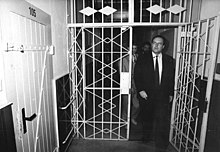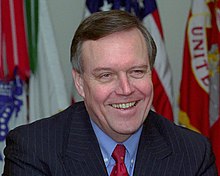Volker Rühe
Volker Rühe (born September 25, 1942 in Hamburg ) is a German politician ( CDU ). He was Secretary General of the CDU from 1989 to 1992 and Federal Minister of Defense from 1992 to 1998 .
Life and work
Rühe was born in Hamburg-Harburg as the son of a high school teacher and grew up there. In 1960 he attended Hurstpierpoint College in Sussex for a few weeks . After graduating from the Friedrich-Ebert-Gymnasium in Hamburg-Heimfeld in 1962, he completed a teaching degree in German and English at the University of Hamburg from 1962 to 1968 , which he finished with the first state examination in 1968 and the second in 1970 with the second state examination for higher education . He was postponed from military service due to his studies and then later no longer drafted because of his age. Until 1976 Rühe worked as a teacher again at the Friedrich-Ebert-Gymnasium in Hamburg, most recently as a senior teacher .
Rühe works as a consultant for the private equity company Cerberus . He was a member of Helmut Schmidt's Friday Society .
Rühe is married to Anne Rühe and has three children.
Political party

Rühe has been a member of the CDU since 1963. From 1972 to 1974 he was chairman of the Working Group of Christian-Democratic and Conservative Youth Associations (DEMYC). From 1973 to 1975 he was a member of the federal board of the Junge Union . Between 1983 and 1989 he was chairman of the Federal Committee on Foreign and Security Policy of the CDU. He then took over the post of Secretary General of the CDU from 1989 to 1992 under party chairman Helmut Kohl . From November 1998 to February 2000 he was deputy federal chairman of the CDU.
MP
From 1970 to 1976 he was a member of the Hamburg Parliament ; In 1973 he was vice chairman of the parliamentary group ; from 1976 to 2005 he was a member of the German Bundestag . From 1982 to 1989 and from 1998 to 2002 he was deputy chairman of the CDU / CSU parliamentary group . From November 2002 to October 2005 he was chairman of the Foreign Affairs Committee.
Rühe always entered the German Bundestag via the Hamburg state list . He did not run for the 2005 Bundestag election .
Public offices
On April 1, 1992, Rühe was appointed Federal Minister of Defense in the Kohl IV cabinet under Federal Chancellor Helmut Kohl. Rühe followed Gerhard Stoltenberg (1928–2001), who had resigned the day before. He remained Minister of Defense until the end of the 1994–1998 legislative period ( Kohl V cabinet ). The strategic realignment of the Bundeswehr and NATO after the end of the East-West conflict took place during Rühe's tenure . The first German participation in UN missions in Somalia and Cambodia was limited to the provision of medical troops. The participation of NATO on behalf of the UN in the Bosnian War sparked a domestic political discussion about the compatibility of German military operations with the Basic Law, in which Rühe and the CDU / CSU advocated a constitutional amendment with the establishment of deployment options for the Bundeswehr. The “out-of-area judgment” of the Federal Constitutional Court of July 12, 1994 on the Bundeswehr's foreign deployments then created the prerequisites for deploying the Bundeswehr in UN and NATO operations without changing the constitution , which was the case with air surveillance measures during the Bosnian War ( Operation Maritime Monitor , Operation Deny Flight , Operation Deliberate Force ) and peacekeeping ( IFOR , SFOR ) took place for the first time. Rühe also played a decisive role in the reorientation of NATO, as, together with Helmut Kohl and the then Federal Foreign Minister Klaus Kinkel, in years of negotiations, both the hesitant US government ( Clinton cabinet ) and the European NATO partners of the necessity of a rapid expansion of the NATO could convince East .
He was the top candidate of the CDU for the office of Prime Minister in the state elections in Schleswig-Holstein on February 27, 2000 ; but the CDU received almost 8 percentage points less than the SPD with incumbent Heide Simonis . In polls before the election, Rühe had been clearly ahead of Simonis for a long time; the uncovering of the CDU donation affair surrounding ex-Chancellor Helmut Kohl in the spring of 2000 deprived Rühe and the CDU of the victory they believed to be certain.
After Wolfgang Schäuble resigned as chairman of the CDU and the CDU parliamentary group, Rühe was at times considered a possible successor; But then the then CDU general secretary Angela Merkel became CDU chairwoman and Friedrich Merz was chairman of the parliamentary group.
Rühe is a member of the European Leadership Network and heads the Bundestag commission set up in April 2014, which advises on easing the parliamentary requirement for Bundeswehr missions abroad (see Parliamentary Participation Act ).
Positions, miscellaneous
Volker Rühe is considered an Atlanticist , i.e. a proponent of close German ties to the United States, and speaks out in favor of interlinking foreign and security policy . As defense minister, he favored the idea of a collaboration between Antonov and Airbus with the aim of further developing the prototype Ukrainian transport aircraft Antonov An-70 instead of commissioning Airbus to build a new “Future Large Aircraft”. In July 2011, Rühe called for a sale of 200 Leopard 2 tanks to Saudi Arabia, which the black-and-yellow federal government had advocated, not to take place.
Rühe is (as of mid-2019) chairman of the Bundestag's “Commission for the review and safeguarding of parliamentary rights when mandating foreign deployments of the Bundeswehr”.
Publications
- with Dieter Biallas and Hans-Ulrich Klose : SPD - CDU - FDP. Contributions to the policy of political parties. Lütcke & Wulff, Hamburg 1974.
- with Karsten Voigt : More trust - fewer weapons. Military detente in Europe from the Soviet and German point of view. With a documentation by Eberhard Schneider . Bonn Aktuell, Stuttgart 1987, ISBN 3-87959-306-X .
- Germany's Responsibility - Perspectives for the New Europe. Ullstein, Frankfurt am Main 1994, ISBN 3-550-07069-1 .
- The Bundeswehr of the future. In: Marion Dönhoff (Ed.): What is in store for us? Guesswork about the 21st century. On the occasion of Helmut Schmidt's 80th birthday. Siedler, Berlin 1999, ISBN 3-88680-671-5 , pp. 35-42.
- September 11th, 2001. New self-image of American foreign policy. In: Internationale Politik Vol. 56 (2001), H. 12, S. 37-42.
- Being important for one another: time for sobriety. The transatlantic relationship needs a new foundation. In: Internationale Politik Vol. 60 (2005), H. 3, pp. 58–64.
literature
- Karl Hugo Pruys : Volker Rühe. For a safe world. Portrait. With 104 photos by Laurence Chaperon. Edition Q, Berlin 1994, ISBN 3-86124-252-4 .
- Military History Research Office (Ed.): Volker Rühe - in the middle of Europe. MGFA, Potsdam 2012, ISBN 978-3-941571-22-8 ( content , preview on Google Books).
Web links
- Literature by and about Volker Rühe in the catalog of the German National Library
- Biography at the German Bundestag
- Dorothea Oelze: Rühe, Volker. Biography. In: KAS .de .
- “I've always been a foreign policy maker”. Former Federal Defense Minister on reunification, alliances and the CDU donation affair. Volker Rühe in conversation with Stephan Detjen . In: Deutschlandfunk , series Contemporary witnesses in conversation , August 30, 2012.
Individual evidence
- ↑ Second career with private equity . Financial Times Germany. June 25, 2007. Archived from the original on September 14, 2009. Retrieved March 16, 2012.
- ↑ See Volker Rühe: Foreword. In: Christoph Schwegmann (Hrsg.): Probation tests of a nation. Sending the Bundeswehr abroad. Duncker & Humblot, Berlin 2011, ISBN 3-428-13570-9 , pp. V – XV ( preview on Google books).
- ↑ Volker Rühe: The Failed. In: Spiegel Online . April 10, 2000, accessed May 14, 2020 .
- ↑ www.europeanleadershipnetwork.org , last accessed on July 16, 2017
- ↑ Eike Böttcher: Rühe heads the commission on missions abroad. In: Bundestag.de , April 10, 2014. See also Rühes Comeback. In: Der Spiegel , February 17, 2014, and the opposition boycotted the Rühe Commission. In: Der Spiegel , March 20, 2014.
- ^ Dietmar Seher: East-West armaments project before failure. In: berliner-zeitung.de. Berliner Zeitung , October 22, 1997, accessed on October 26, 2010 .
- ↑ Ex-Minister Rühe calls for a halt to the tank business . Mirror online. July 9, 2011. Retrieved March 16, 2012.
- ↑ bundestag.de ( Memento from August 16, 2017 in the Internet Archive ) (accessed on August 13, 2017)
| personal data | |
|---|---|
| SURNAME | Rühe, Volker |
| BRIEF DESCRIPTION | German politician (CDU), MdHB, MdB |
| DATE OF BIRTH | September 25, 1942 |
| PLACE OF BIRTH | Hamburg |

